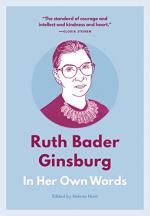
|
| Name: _________________________ | Period: ___________________ |
This test consists of 15 multiple choice questions and 5 short answer questions.
Multiple Choice Questions
1. What is the advice Ginsburg says her mother-in-law gave her regarding marriage?
(a) Take marriage one day at a time.
(b) It helps sometimes to be a little deaf.
(c) It helps being a good cook.
(d) Make your husband think he is always right.
2. What is one of Ginsburg’s fondest memories?
(a) Going on hikes with her mother.
(b) Playing the piano with her sister.
(c) Singing in her school choir.
(d) Sitting on her mother’s lap, while she read to her.
3. Ginsburg describes 1950s graffiti. What does this graffiti NOT say?
(a) Study hard.
(b) Get your degree.
(c) Get married.
(d) Get a good job.
4. A great jurist once said the way to fight false facts is what?
(a) By banning all news.
(b) By true facts.
(c) By ignoring those facts we do not like.
(d) By making up even greater false facts.
5. How does Ginsburg feel when people say to make it to the top of the tree you have to give up a family?
(a) It angers her.
(b) It pleases her.
(c) It bothers her.
(d) It does not phase her.
6. What is Ginsburg’s lucky number?
(a) 2.
(b) 1.
(c) 4.
(d) 7.
7. How does Ginsburg say her daughter, Jane, helps her?
(a) She helps Ginsburg be a whole person.
(b) She helps Ginsburg with her court cases.
(c) She helps Ginsburg study for exams.
(d) She helps Ginsburg with James.
8. To what does Ginsburg compare the important issue of healthcare today?
(a) Senior and survivor benefits of the 1930s.
(b) Dental and eye care of the 1940s.
(c) Universal healthcare in other countries.
(d) The lack of healthcare during the Industrial Revolution.
9. Who are the two people to whom Ginsburg attributes her law school success?
(a) Her in-laws.
(b) Her colleagues.
(c) Her husband and daughter.
(d) Her mother and father.
10. What are the two factors Ginsburg lists as to why the atmosphere regarding the women's rights movement changed in the late 1960s?
(a) The virtual disappearance of food and goods cultivated or produced at home and the access to more effective means of birth control.
(b) The economy was much improved and the civil rights movement had changed the attitudes of many regarding African Americans.
(c) Men began to care about women as equals and women had earned the right to vote.
(d) More women were in the workforce and more men were staying home with children.
11. Ginsburg says the idea in the 1950s and 1960s regarding why a woman's voice could be tuned out was what?
(a) She was just like a small child.
(b) She was uneducated and therefore unimportant.
(c) She had nothing significant to say.
(d) She was no smarter than a dog.
12. What does Ginsburg think of the expression, "women's rights"?
(a) It is outdated.
(b) It is a bit problematic.
(c) It is completely inaccurate.
(d) It describes the issue perfectly.
13. What case held Virginia's ban on interracial marriages unconstitutional?
(a) Plessy v. Ferguson.
(b) Brown v. Virginia.
(c) Roe v. Wade.
(d) Loving v. Virginia.
14. What plan does Ginsburg say may hasten the closing of the divide between various races in the U.S.?
(a) The Civil Rights Movement.
(b) The Me Too Movement.
(c) Affirmative Action.
(d) Black Lives Matter.
15. Who is NOT a women's rights activist Ginsburg mentions?
(a) Zelda Fitzgerald.
(b) Sara Grimke.
(c) Susan B. Anthony.
(d) Elizabeth Cady Stanton.
Short Answer Questions
1. What does Ginsburg think about the schools that openly take race into consideration when looking at student applications?
2. Why were women employees at one point not allowed health insurance coverage for their families?
3. In a talk in 1978, Ginsburg says that Civil Rights laws do not prohibit discrimination on what basis?
4. Who told Ginsburg she should change the wording from 'sex' to 'gender'?
5. If Ginsburg had any talent God could have given her, what would she want to be?
|
This section contains 683 words (approx. 3 pages at 300 words per page) |

|




